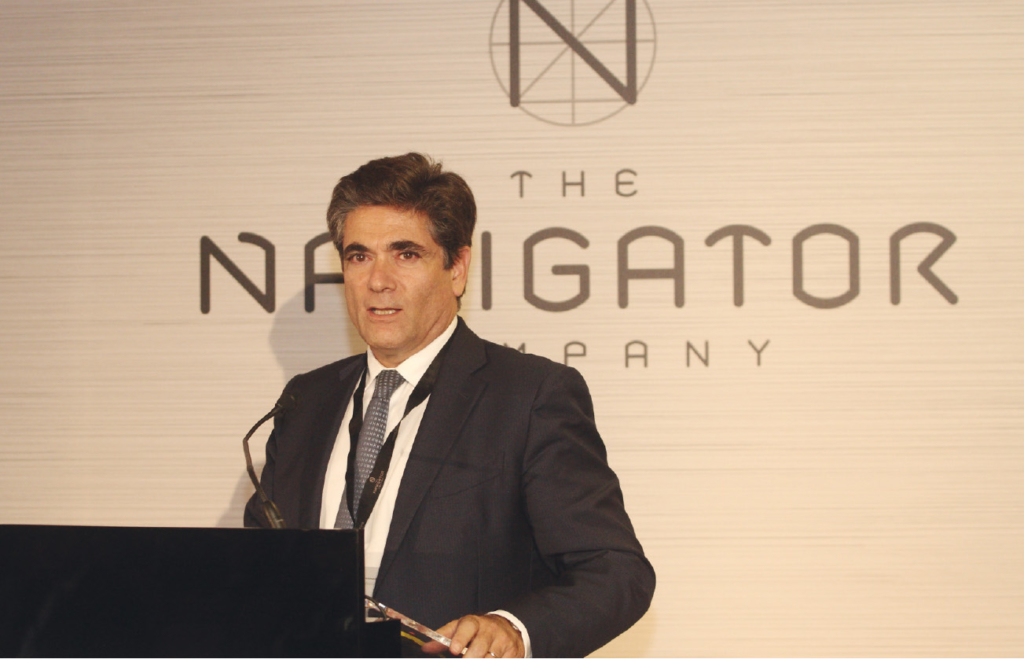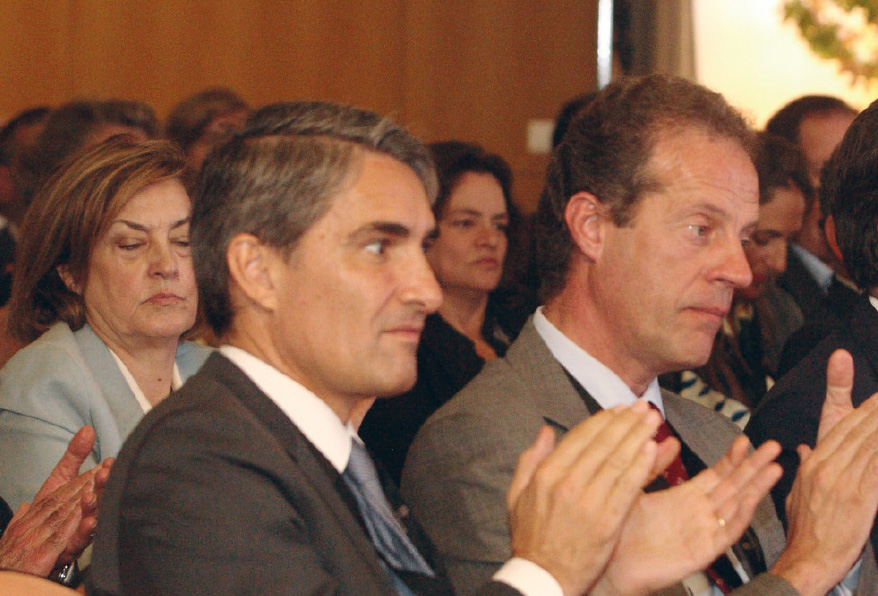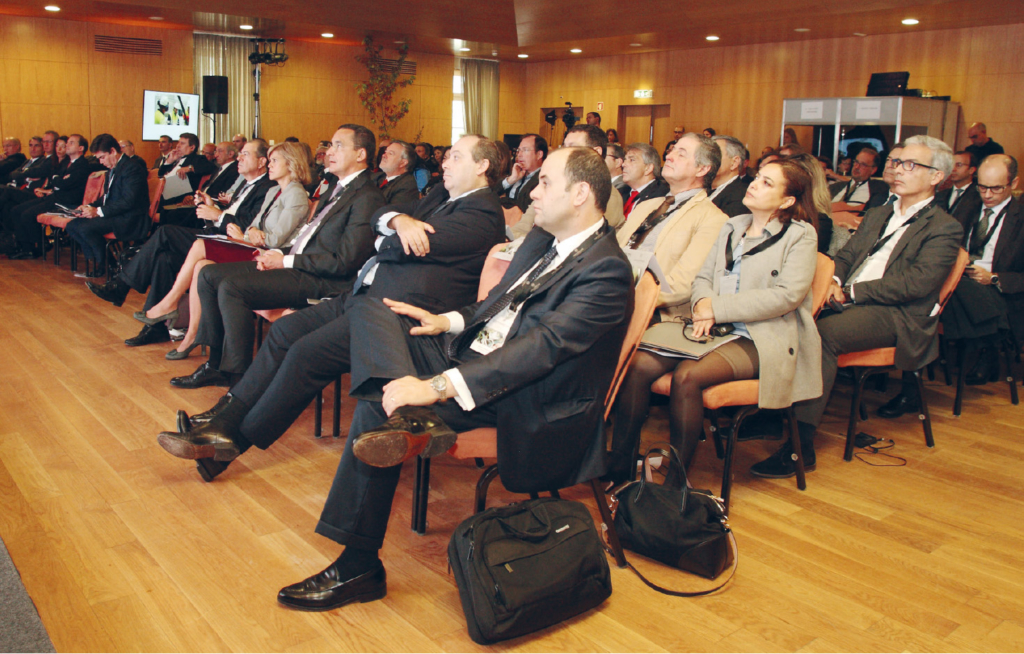The seventh edition of the Sustainability Forum (October 2018) focussed on a success story: the new cycle in Cacia. But the Forum, set up by Navigator as a framework for regular debate, did more than just tell the Cacia story: it showed how the evolution of this industrial unit encapsulates the Company’s broad vision of sustainable development.
At a session attended by around one hundred participants, the topics discussed included investment in tissue paper (the new business area in Cacia), partnerships between companies and local entities, and also the unit’s contribution to developing the community.

“Organisations don’t stand still, they change,” commented Diogo da Silveira, The Navigator Company’s CEO at the time, stressing that the new capital project “has permitted the complex to make a qualitative and quantitative leap.” The investment of 121 million euros in Cacia, he pointed out, is part of a business model designed to impact positively on society, generating value for the Company and the community.
Diogo da Silveira ended the session with the message that companies that endure live through periods of calm, and others of uncertainty. “This has also been the story of Cacia. Even when times were hardest, its staff have always been ready to put in the extra effort and imagination needed to overcome every obstacle. Cacia has evolved a special company ethos that enriches the culture of the Navigator Group,” the CEO pointed out, assuring his audience that this new cycle in Cacia will help to consolidate Navigator’s sustainability.
The tissue business and environmental optimization
Nuno Santos, Executive Director of The Navigator Company, centred his presentation on Navigator’s new tissue business. This is a growing segment worldwide, and by investing in its Cacia site, tissue is now an important element Navigator’s plans to diversify its portfolio. Expectations point to tissue paper representing 15 to 20% of the Company’s total sales in 2025. He went on to say that this is more than just a new business area, representing a cycle of sustainable production, from forests to paper, using cutting edge technology and certified environmental management.

In another of the presentations, José Nordeste, Plant Manager in Cacia at the date of the Forum (and now the new Plant Manager in Setúbal), drew attention to the projects to improve efficiency, increase production capacity and optimise environmental performance. It was made clear that great efforts have been made to reduce the unit’s impacts on the environment, from water use through to odours and noise, not to mention the reuse of waste in keeping with the circular economy concept
Valorisation of waste and the essential economic foundations
Eager as ever to include viewpoints from outside the Company, the Sustainability Forum also heard presentations from Sara Lacerda, Product Quality and Safety Manager for Saint-Gobain Weber Portugal, and also from Pedro Silva, Director of Advisory Services at
KPMG Portugal.
Sara Lacerda presented a real-life example of a partnership between Saint-Gobain Weber Portugal, Navigator and ARFIL (a company that collects sands and prepares them for use) involving reuse of sands resulting from operation of Navigator’s biomass power plants, which are processed into silica or recycled sand. This product is used in producing mortars, allowing Weber Saint-Gobain to save around 700 tons of natural sand each year.
Focusing on the essential economic foundations for sustainability, Pedro Silva presented the findings of the research conducted byb KPMG into integration of tissue operations at the Cacia Complex: around 1260 direct, indirect and induced jobs in 2010 (of which 762 in the Aveiro region alone), an impact of 51 million euros on the region’s GDP and more than 55 million for the rest of the country, with 38% of purchases being made locally, in a context where 75% of output is for export.
Supporting the local communities
Navigator’s seventh Sustainability Forum also featured a panel debate, centred on the importance of the Company supporting its various local communities. Moderated by Cristina Tomé, guest lecturer in Ethics and Social Responsibility at Universidade Católica Portuguesa (UCP), the panel consisted of Luís Sarabando, Technical Coordinator for the Lower Vouga Forestry Association (AFBV), Paulo Peixoto, ATEC Northern Region Manager and Manuel Alvelos Marques, Principal of the United Schools of Rio Novo do Príncipe.

Summing up, Cristina Tomé said: “The Lower Vouga Forestry Association represents the view of forestry producers and their vital role in supplying certified raw material; the ATEC Training Academy is responsible for training production and industrial maintenance technicians and for building a laboratory at the Cacia unit to provide hands-on training; and the United Schools of Rio Novo do Príncipe is a representative of the community, with which the company works on supporting enterprise projects and raising student awareness of sustainability issues. This shows the degree of maturity achieved by Navigator in the fields of sustainable growth and value creation, and how this has a beneficial impact on others.”
The recent investment of 121 million euros in Cacia is part of a business model designed to impact
positively on society, generating value for the Company and the community.